Attitude witnessed transphobia on set of TV show that aired on BBC One – here’s why we’re speaking out
Transphobia: it's now so prevalent that it even occurs on the sets of queer-themed shows that go to great lengths to prevent it, as Attitude found in 2023 on the set of Lost Boys and Fairies
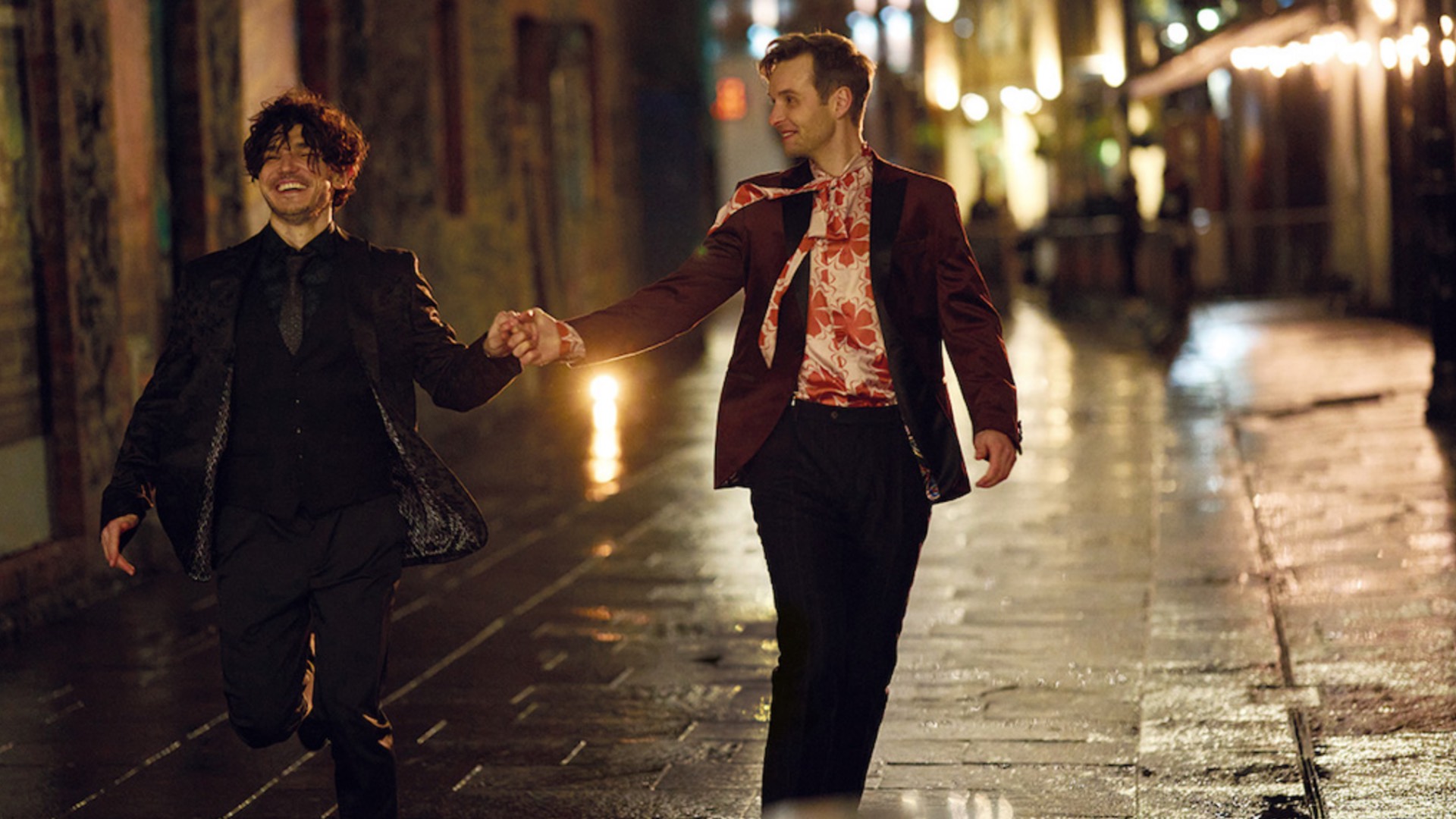
In May 2023, Attitude visited the Cardiff-based set of Lost Boys and Fairies, a critically-acclaimed drama about a gay couple’s journey to adoption, which recently aired on BBC One. While there, we overheard one crew member subjecting another to a highly transphobic line of questioning. A year later, in this feature taken from Attitude issue 360, we do a deep dive into this extraordinary miniseries, revisit what we witnessed, share the joint response issued by the BBC and production company Duck Soup Films [highlighted in purple below], and reflect on what the incident reveals about the pervasiveness of transphobia today.
An ornate drag queen belts out an 80s classic to a crowd of peacocking queers in an LGBTQ+ venue for the ages: a cavernous former bank in Cardiff where the currency isn’t cash, but sequins. It’s a place of high ceilings and impressive architecture, run down to a sublime state of ugly prettiness. Good lighting elevates everything. If the club, Neverland, sounds too good to be true, that’s because it is. It’s not a rocking Friday night, either, but an unseasonably cold day in May 2023. And that 80s classic? Not ‘Relax’ or ‘It’s Raining Men’, but the frighteningly melancholic ‘Mad World’ by Tears for Fears, which resurged in 2001 after appearing on the soundtrack to lost boy classic Donnie Darko. It’s a fitting song for this scene in BBC One drama Lost Boys and Fairies and reflects the inner life of one of its main characters, Gabriel, a gay TV antihero who’s a joy to find.
Captain’s hook
Directed by James Kent (The Capture, Testament of Youth) and produced by Duck Soup Films, BBC Cymru Wales and BBC iPlayer, Lost Boys and Fairies stars Fra Fee as Andy, and Sion Daniel Young as Gabriel. It follows this outwardly happy and stable gay couple in their thirties as they journey towards adopting a seven-year-old boy, Jake, played by Leo Harris.
But in this Cardiff-set three-parter, the clue is in the title. The couple’s decision to adopt dredges up a truckload of unresolved trauma — mostly Gabriel’s. We see him as a child smacked by his dad for wearing a dress, as a public toilet-frequenting schoolboy hallucinating demons while praying the gay away, and finally as an inebriated adult, fucking the pain away in a sling.
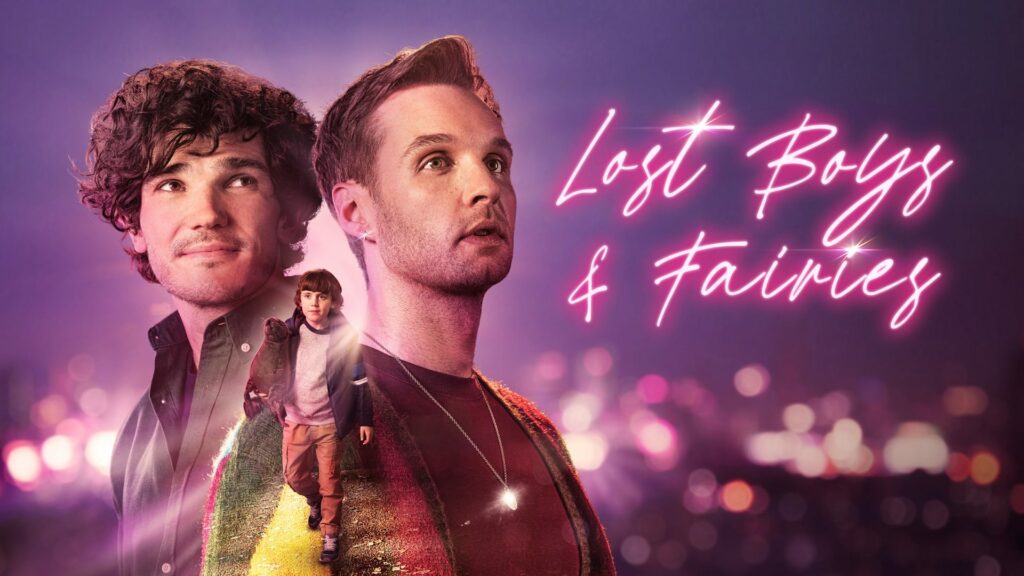
With a title inspired by J.M. Barrie’s classic fairy tale, the series’ major themes include the passing of time and growing up, often with great difficulty, as a queer person. And, of course, the pop psychological concept of Peter Pan syndrome anecdotally prevalent among gay men. (Oh, you’re going to deny it?!)
One of the ways Gabriel handles his trauma is through sex. Suffice to say, his relationship with it isn’t the healthiest. Imagine Nathan from Queer as Folk 25 years later after a few wrong turns and you are part way there.
“It’s been a really interesting process,” says Daf James, the series’ writer, of the sex scenes. “Because it’s primetime BBC One, what I really wanted to do is to tell a queer story without compromise to a mainstream audience. And taking that audience with me on that journey.” Prepare for harnesses and dildos. “We’ve had an amazing intimacy coordinator, David Thackeray,” adds James. “Working with David has been extraordinary, just in terms of how comfortable he made not just the performers, but us, the crew, the set.”
Of course, sexual freedom is not necessarily a bad thing, if you’re being safe, and are doing it for the right reasons. Being a lost boy can be fun, can’t it? I ask the following question aloud in Fee’s trailer: “Why shouldn’t we enjoy an extended adolescence?”
“That’s very true,” replies the 34-year-old, known for roles in the Oscar-winning 2012 film adaptation of Les Misérables, Marvel show Hawkeye and stage hit Cabaret. “That’s possibly where Andy and Gabriel differ. They both have issues with their parents — Andy’s dad is absent, but he wants to be a good father in the way that he didn’t have one. Andy is fully ready to embrace the responsibility of parenthood. This is conjecture, but maybe Gabriel isn’t quite ready.
“He’s realising that there’s a lot of baggage that he thought he dealt with that he hasn’t,” is how Young, 32, who plays Gabriel, describes it over lunch. The star, whose previous screen credits include The Left Behind and Deceit, continues, “That’s causing problems on every front. He tries to sort of ignore it, but things just keep cropping up. And actually, his relationship with his dad, his relationship with Andy, his relationship with himself as a younger Gabriel rears its head, and he has to manage it.”
Peter panic
For Gabriel, the pressures of potential parenthood, paired with unthinkable personal tragedy, reignite old addictions: drink, drugs, anonymous sex and, most insidiously of all, self-doubt. None of which is helpful for a person facing a painstakingly forensic adoption panel. A person who, it’s clear, makes for a resoundingly fantastic father figure while sober. It’s bitterly ironic, then, that Gabriel seems further behind on the road to self-acceptance than rainbow family relatives half his age. Take this spiky line of dialogue uttered by scarily hip young theyby Celyn, directed at Gabriel’s inability to understand pronouns. “You used to be radical. Now one sniff of parenthood, and you’ve turned fucking straight.”
“Young queers are so angry all of the time,” Gabriel later complains of this epic read. “Cancelling people. Decimating careers on Twitter. We used to be attacked by straights for being too queer. Now the queers are attacking us for not being queer enough … How the hell am I supposed to guide Jake through all of this when I don’t understand the world anymore?” Spoiler alert: he and Celyn — played by Shaheen Jafargholi — kiss and make up in the end.
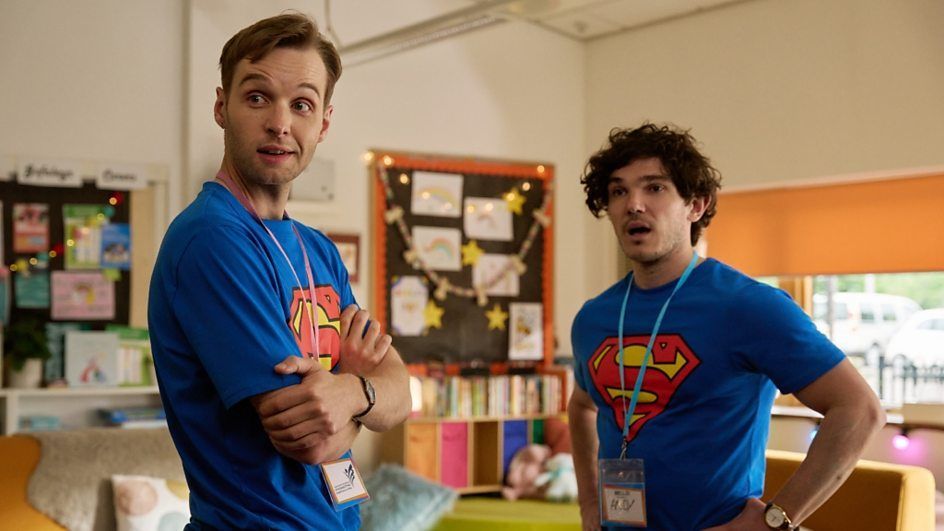
Still, Celyn and Gabriel have more in common than meets the eye. “They’re a non-binary character who is my age, roughly, about 25 or 26,” says Jafargholi. “They’re not a drag queen as such. They’re a performer at the club. So, they’re very theatrical. They’re outspoken, funny — but I think all of those things are armour, essentially, that cover up insecurities, which we explore a little bit.”
Then there are their visually captivating stage personas. “This is quite a specific week, because we’re in Neverland,” whispers Young, referring to the fantasy club, as filming resumes. “So, it feels really different to all the other stuff we’re doing. Less dialogue scenes, more musical numbers. And last week, dance rehearsals! … We’ve been building towards this. The singing lessons, the recordings, and then everything comes together: the design team, the makeup team, to try and actually make this work.” If you’re under the illusion that less dialogue means less pressure, think again. “It feels like more pressure! The songs are so important story-wise, and there are only a handful of them. I’ve got four in Neverland.”
Discussing Neverland with series creator James, 44, I tell him that it takes me straight back to my first time in a gay bar, in Cardiff’s three-level Golden Cross. He joins me in reminiscing. “I loved Vauxhall Tavern; I loved going to Duckie,” he says of Neverland’s inspiration, as he props up the bar during a break in filming. “And I started going to the clubs here [in Cardiff] when I was 15, 16. Clubs like Exit and Club X that are no longer here, sadly, but still have a massive space in my heart. Neverland, however, is something different. I created the queer club space I wished existed growing up. It’s a mythological world that’s haunted me creatively since I started writing.”
Fee compares it to the festival Secret Garden Party. “Last year, there was a really good LGBT tent,” he says. “It was the best part of the festival, actually. So inclusive, and Neverland is just that. I wish there was one in every city! Maybe after the success of the show, [we] can start a franchise.”
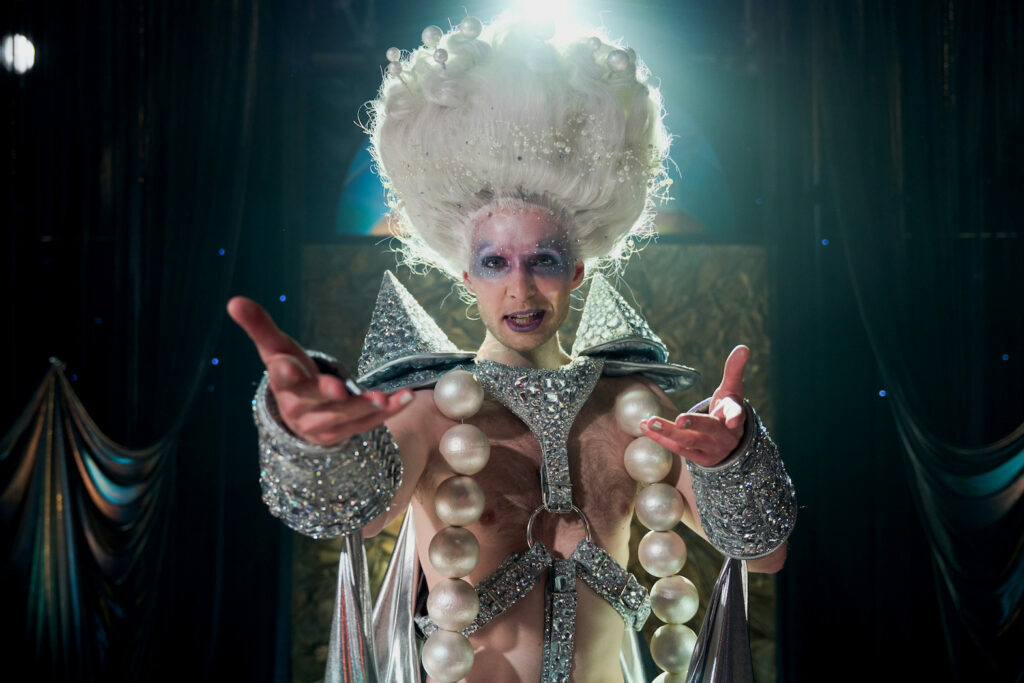
Sadly, it transpires Neverland as a set is not a safe haven for quite every LGBTQ+ person present. Despite the fantastically positive and inclusive attitudes of everyone Attitude interacts with directly on the day of our visit in May 2023, we at one point regretfully overhear one crew member subjecting another to what we interpret as a sustained, highly transphobic line of questioning in a very loud and obnoxious manner. Attitude believes speaking up on behalf of the victim at the time could have made matters worse.
A year later, a joint statement from the BBC and Duck Soup Films provides Attitude with the following on-the-record response: “Though we can’t comment on individual cases, we do not tolerate discrimination of any kind. The Lost Boys and Fairies set was a fully inclusive workplace, with a range of wellbeing and training initiatives that went beyond industry-standard to ensure that all colleagues were supported and respected.”
Attitude has also been informed that the exchange observed was dealt with immediately on the day by the production’s wellbeing facilitator and senior members of the production team and was resolved ahead of Attitude magazine raising concerns the following day. No official complaint was lodged, and further support was available for those involved. The individual who made the comments in question was freelance, day staff. These staff received Duck Soup’s Equal Opportunities Anti-Harassment & Bullying policy as part of their call sheets, while full-time staff were required to complete the ScreenSkills Well Work series of online training in advance. Plus, all staff were provided with the BBC Respect at Work guidelines, Duck Soup’s Equal Opportunities, Anti-Harassment & Bullying policy, had access to a wellbeing facilitator and the support of TV industry mental health organisation Solas Mind. Furthermore, the Lost Boys and Fairies production team worked with Iris Prize, ScreenSkills, Sgil Cymru, Screen Alliance Wales and Culture Connect Wales to ensure that the cast and crew were representative of the LGBTQ+ community and beyond.
Attitude has spent a year weighing up the ethical implications of sharing this information publicly. We do so now without having attempted to contact or reveal any identifying information about either party, primarily to respect the victim’s right to privacy and to minimise risk of further harm, because we believe it is in the public interest to do so. We hope that it raises awareness of the fact that transphobia is now so prevalent in our society that it even occurs on the set of queer-themed TV shows that have gone to great lengths to counteract such possibilities. We hope that, in the inclusive spirit of Lost Boys and Fairies itself, this
disclosure promotes public discourse around safe spaces and the need for stricter enforcement of anti-discrimination policies in the workplace, and the inescapable reality that people need to be able to do their jobs and earn money without being treated in this way. We hope it promotes a kinder, more respectful attitude towards all LGBTQ+ people, and particularly gender-diverse people, and especially trans people, in the workplace and beyond.
On with the show… in Neverland, we see Gabriel perform as a drag artist but he “doesn’t identify as drag”, explains Young of his character. Instead, he “sees it more as performance art. Although he identifies as ‘she’ in Neverland and when performing, he’s a ‘he’ in day-to-day [life]. And in terms of the aesthetic, it’s less RuPaul, more Taylor Mac,” says Young. Indeed, if some of the stage moments seem underwhelming, ask yourself if a certain TV show has numbed you to subtlety in gender performance.
“I haven’t really watched RuPaul’s Drag Race — am I allowed to say that?!” says James, tellingly. “But I’m absolutely thrilled by what it’s done culturally and obviously know loads of people who are into it.” James also tells me about his own drag alter ego, which sounds joyfully old school. “She’s called Sue. She’s not the type of performer you’ll see on RuPaul. I’ve got my version of drag. She has sensible shoes, plays the piano and sings. I started in 2009 and have done three shows with her.” Sign us up!
You can fly
Truth be told, we were relieved by the lack of ‘ferocity’ in Lost Boys and Fairies, and its focus on complex adults after the youth-focused super hits Sex Education, It’s a Sin and Heartstopper. And to be clear, it’s as important and potentially valuable a show for young audiences as it is for the main characters’ demographic. Outside the stardust of Neverland, the programme asks serious, sober questions about family, legacy, survival and how we cope with life’s curveballs. It is nourishment we didn’t know we needed, and it benefits from real-life authenticity.
“It’s very much personally inspired … I’ve adopted three children: they’re 11, eight and four,” says James, beaming with pride. “It’s from my own lived experience. But it’s dramatised. There are things in it which aren’t true, but there’s a lot of things in it which are very real.” What are his top tips for juggling work and parenthood? “I have a very understanding husband,” he explains. “I’m also really fulfilled in my own self and my work, and my kids see how much I adore my work.”
“So, Daf and I have known each other for 13 years,” explains Young of the real-life friendship that adds further depth to the material. “One of my first jobs was one of his first plays, which is essentially a prequel to this. And obviously, a lot of this is based on his life experiences. So, we’ve had a lot of conversations. But his scripts are so much more detailed than the normal types of scripts that you’d ever get sent. Everything is on the page for you. And whenever I’ve read something, and I’ve been shocked by something, that’s what’s been amazing. I can call Daf and get, like, real clarity on it from the source.”
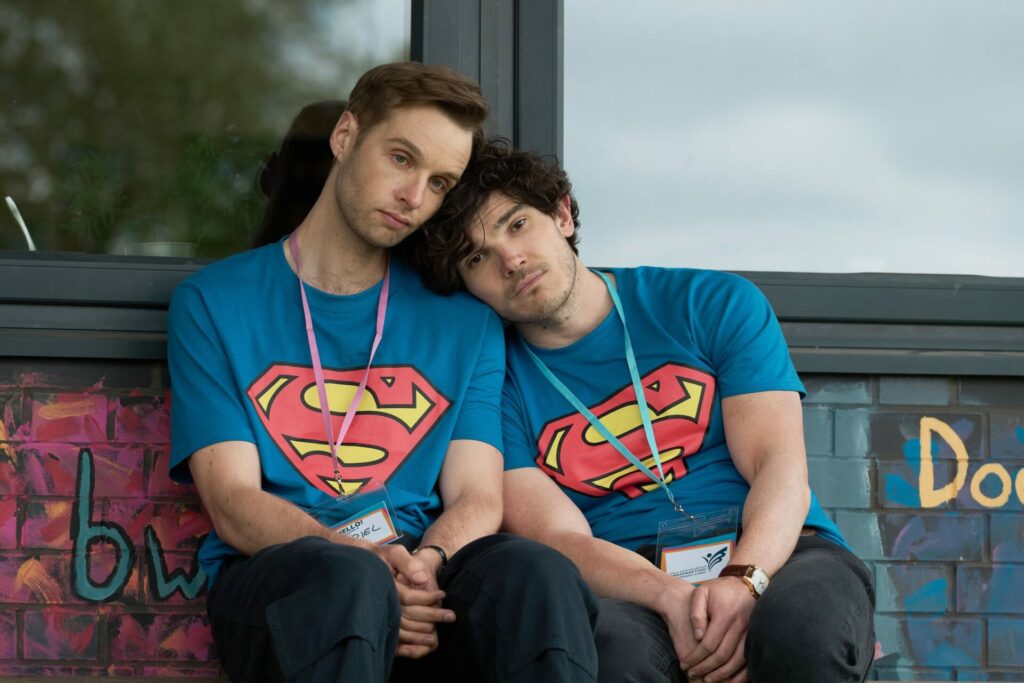
I put to James my perception of the adoption process being incredibly difficult. Lost Boys and Fairies certainly depicts it as unpredictable, albeit a rocky road gracefully smoothed over for the main characters by a breathtakingly supportive social worker named Jackie, played with beautiful warmth by Elizabeth Berrington. “I actually didn’t find the process difficult, I have to say,” shares James. “We adopted twice. Our first two when they came together as a pair. Then a couple of years later, we went for another one. I have to say that our experience with the adoption agency and social services has been remarkable. We’ve had an incredible amount of support. I kind of want to say that for the record. Of course, there are lots of other cases where things go wrong; there are challenges. Social services suffer from lack of resources and so on. But our experience has been overwhelmingly positive. And actually, I wanted to also put that on screen, [to] authentically represent our adoption experience. This is our perspective on it. Everyone will have different perspectives, and we often see social services painted in a negative light. For me, our social workers were our superheroes.”
Fee shares his own perspective, “Coincidentally, days before I got the job, two of my very good friends sent me a photograph of their two boys that they’re adopting. Brothers — they didn’t want to separate them. It was useful to chat to them about the process. I have another few friends in New Zealand who went through the process. Everyone’s journey is different. Some longer than others. Some surprisingly short.” Besides, however complex an adoption story may be, it’s ultimately testament to how much love the individuals in question have to share. “It certainly wouldn’t put me off,” opines Fee, who’s clearly been heavily affected by the material in Lost Boys and Fairies, and seemingly considering fatherhood for the first time. “Fostering, and particularly adoption — it’s an incredible thing to do. If two men or two women are prepared to invite a kid into their lives, a kid that really needs support and the chance to live a full life with love and support and everything, then I think it’s worth the fight, if it’s difficult. It certainly hasn’t put me off — quite the opposite. I think it’s food for thought. ‘Oh my God — do I want to do this?’ I hadn’t thought it was my destiny.”
“If you’re interested, parenting should be for anyone,” James goes on. “Whether or not you’re single, in a couple, gay, straight, what your sexuality is. I’m obviously an extraordinary advocate for adoption, having gone through this process. There are so many kids out there who need love and too many homes, and if anyone has the capacity to share love, then there are kids in need.”
Lost Boys and Fairies is available to watch on BBC iPlayer now
